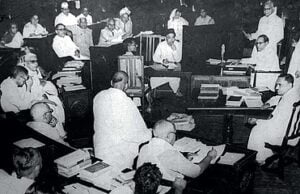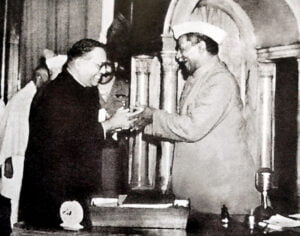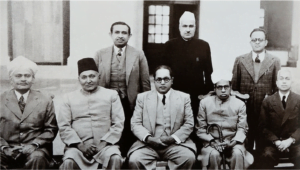The Constituent Assembly had 22 committees, divided into three categories: Procedural, Substantive, and Drafting committees. The procedural committees dealt with the rules and functions of the assembly, such as the Steering Committee and the Rules of Procedure Committee. The substantive committees dealt with the content and structure of the constitution, such as the Union Constitution Committee and the Fundamental Rights Sub-Committee. Finally, the drafting committee was responsible for preparing the final draft of the Constitution.

Constituent Assembly | Photo Credit: Outlook India Archive
Procedural Affairs Committees:
- Steering Committee: The committee chaired by Dr. Rajendra Prasad, was responsible for supervising the general business of the Constituent Assembly and preparing the agenda for its sessions.
- Rules of Procedure Committee: The committee also chaired by Dr Rajendra Prasad, was responsible for framing the rules and regulations for the functioning of the Constituent Assembly and its Committees.
- Committee on the Effect of the Indian Independence Act of 1947: The committee chaired by Alladi Krishnaswami Ayyar, was responsible for examining the implications of the Indian Independence Act of 1947, which granted independence to India and Pakistan, on the work of the Constituent Assembly.
- Orders of Business Committee: The committee chaired by K.M. Munshi, was responsible for arranging the order of business for each session of the Constituent Assembly and ensuring that the time allotted to each item was adhered to.
- Credentials Committee: The committee also chaired by Alladi Krishnaswami Ayyar, was responsible for verifying the credentials of the members of the Constituent Assembly and reporting any vacancies or changes in membership.
- House Committee: The committee chaired by B. Pattabhi Sitaramayya, was responsible for providing accommodation and other facilities to the members of the Constituent Assembly and maintaining discipline and decorum in the assembly hall.
- Hindi Translation Committee: The committee chaired by N.G. Ranga was responsible for translating the proceedings and documents of the Constituent Assembly from English to Hindi.
- Urdu Translation Committee: The committee chaired by Bakshi Tek Chand, was responsible for translating the proceedings and documents of the Constituent Assembly from English to Urdu.
- Finance and Staff Committee: The committee, also chaired by Dr Rajendra Prasad, was responsible for managing the finances and staff of the Constituent Assembly and its committees.
- Press Gallery Committee: Chaired by Usha Nath Sen, this committee was responsible for regulating the admission and conduct of journalists and reporters in the press gallery of the Constituent Assembly.

Dr. Babasaheb Ambedkar, chairman of the Drafting Committee, presenting the final draft of the Indian Constitution to Dr. Rajendra Prasad, President of the constituent assembly on 25 November 1949. | Photo Credit: Mid-day Archive
Substantive Affairs Committees:
- Union Powers Committee: The committee was chaired by Pandit Jawaharlal Nehru and was responsible for defining the powers and functions of the central government in relation to the provinces and states.
- Union Constitution Committee: The committee was also chaired by Pandit Jawaharlal Nehru and was responsible for drafting the provisions relating to the structure and organs of the central government, such as the President, Prime Minister, Parliament, Judiciary, etc.
- States Committee: The committee, also chaired by Pandit Jawaharlal Nehru, was responsible for drafting the provisions relating to the admission, integration, and administration of princely states into the Indian Union.
- Provincial Constitution Committee: The committee chaired by Sardar Vallabhbhai Patel, was responsible for drafting the provisions relating to the structure and organs of provincial governments, such as governors, chief ministers, legislatures, etc.
- Advisory Committee on Fundamental Rights, Minorities, and Tribal Areas: The committee chaired by Sardar Vallabhbhai Patel, was responsible for making recommendations on fundamental rights, minority rights, and tribal areas in India. It had three sub-committees on these subjects.
- Fundamental Rights Sub-Committee: This sub-committee chaired by J.B. Kripalani, was responsible for drafting a list of fundamental rights to be guaranteed to all citizens of India, such as equality, freedom, justice, etc. It also dealt with issues such as citizenship, emergency provisions, etc.
- Minorities Sub-Committee: This sub-committee chaired by H.C. Mukherjee was responsible for drafting a scheme of safeguards and representation for religious, linguistic, and cultural minorities in India, such as Muslims, Sikhs, Christians, etc. It also dealt with issues such as separate electorates, reservations, etc.
- North-East Frontier Tribal Areas and Assam Excluded and Partially Excluded Areas Sub-Committee: This sub-committee chaired by Gopinath Bardoloi, was responsible for drafting a scheme of administration and development for the tribal areas in the north-east frontier and Assam, such as Nagaland, Mizoram, etc. It also dealt with issues such as autonomy, representation, etc.
- Committee on the Rules of Procedure: The committee chaired by Dr Rajendra Prasad, was responsible for drafting the rules and regulations for the conduct of business in the parliament of India, such as quorum, voting, motions, etc.
- Special Committee to Examine the Draft Constitution: The committee chaired by Alladi Krishnaswami Ayyar, was responsible for examining the draft constitution prepared by the Drafting Committee and suggesting any changes or improvements in it.
- Ad Hoc Committee on the National Flag: The committee chaired by Dr. Rajendra Prasad, was responsible for selecting a national flag for independent India from among various designs and proposals.

Drafting Committee | Photo Credit: Bar and Bench
Drafting Committee:
The most important committee of all, headed by Dr. B.R. Ambedkar was responsible for preparing a draft constitution based on the reports of other committees. It was tasked with incorporating any amendments or modifications suggested by other committees or by members of the Constituent Assembly.
The Drafting Committee was formed on 29 August 1947, with seven members: Dr B.R. Ambedkar, N. Gopalaswami Ayyangar, Alladi Krishnaswami Ayyar, K.M. Munshi, Syed Mohammad Saadulla, N. Madhava Rau and T.T. Krishnamachari. Later, B.L. Mitter resigned due to ill health and was replaced by N. Madhava Rau. Similarly, D.P. Khaitan died in 1948 and was replaced by T.T. Krishnamachari.
Continue to the next section: What were the processes followed in making the Indian Constitution?
